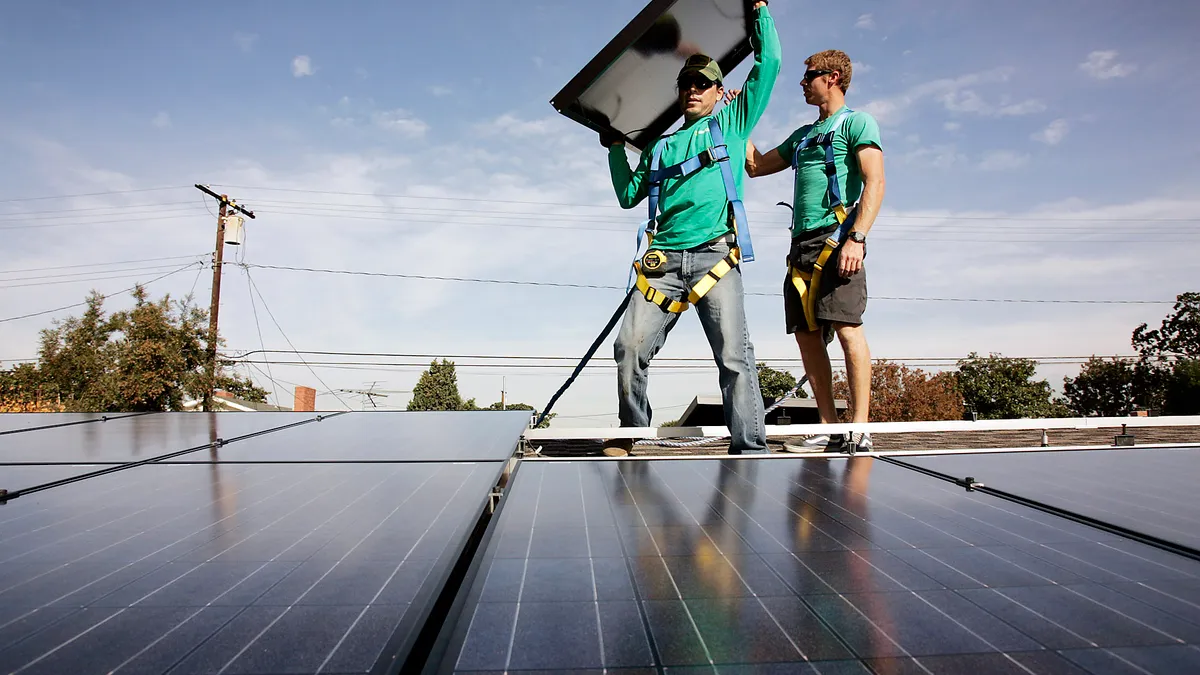Dive Brief:
- The Michigan Public Service Commission (PSC) on Thursday approved a $273.3 million rate increase, an electric vehicle (EV) pilot and distributed generation program for DTE Energy, though it denied the utility's proposed system access charge for solar customers.
- Advocates hailed the passage of DTE's "Charging Forward" three-year EV program, which allows the utility to spend $13 million on incentives for residential and non-residential chargers, along with education and outreach and a school bus charging program.
- Regulators rejected DTE's proposed formula for paying customers with distributed renewable generation. In addition, the new rates, which go into effect May 9, represent a substantially smaller increase than the utility had requested.
Dive Insight:
It's been three years since a Michigan law called for replacing net metering, and now regulators have approved a new distributed generation program as part of DTE's higher rates.
The commission said the new distributed generation program will apply to "all new installations of eligible customer-sited renewable energy in place of net metering." Existing net metering customers, and those who file applications before May 9, will be grandfathered in under the existing net metering program for 10 years.
The commission rejected DTE's proposed distributed generation system access contribution charge, and in a in a statement said it concluded the charge was "not based on a customer's usage of the distribution system and it is not equitable."
The commission also rejected DTE's proposed formula for determining how to pay for electricity generated by solar customers. The utility had proposed credits based on the monthly average real-time locational marginal price for energy. The PSC instead concluded the proper customer compensation would be the cost of the power supply, minus transmission costs.
DTE told Utility Dive in a statement that the company appreciates the commission work on private solar compensation models, and will be evaluating the order.
"We believe non-private solar customers should not have to cover the cost of additional grid use and services for private solar customers," the company said.
Average residential customers using 500 kWh/month will see bills rise by $6.19 or 8.69%. Commercial customers will see a 4.34% increase and industrial customers a 2.5% increase.
DTE approved for 'Charging Forward' pilot
The commission also approved DTE's transportation electrification pilot, which could add thousands of chargers to its service territory.
The utility will be allowed to invest $13 million, including information campaigns for residential and commercial customers, rebates for residential customers who meet program criteria, and up to $20,000 rebates for electric charger site hosts.
The PSC said the pilots aim to:
- maximize program participation at the lowest cost;
- test new technologies that can ensure EV charging loads maximize benefits to all ratepayers;
- ensure investments in make-ready infrastructure address range anxiety and other customer barriers;
- and enable DTE to learn how to "manage charging times and locations, minimize investment in distribution infrastructure, and eliminate adverse grid impacts."
The pilots are an opportunity for a state that "has always been at the heart of America's auto industry," Kevin Miller, director of Public Policy at ChargePoint, said in press statement.
Utilities "play a critical role in our nation's shift to electric mobility," Miller said, commending DTE.
The Charging Forward program will support development of thousands of charging stations, and uses a "make-ready" program design to allow greater choice of technology.
Ultimately, encouraging EV charging to take place during off-peak times of day with smart charging solutions will put downward pressure on electricity rates for all of DTE's ratepayers, said Miller.















